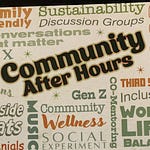Hello, aspiring authors and creative souls!
Today, we’re diving into a concept that has the power to transform how we approach life’s inevitable challenges. Inspired by Brian Johnson of Heroics, we’ll explore the idea of “eating stress and challenges like an energy bar.” Yes, you read that right! Just as an energy bar provides nourishment and a burst of energy during physical exertion, challenges and stress can fuel personal growth and resilience when we embrace them with the right mindset.
We all know that the creative journey can feel like a constant uphill battle. Whether you're staring down a blank page, facing rejection, or struggling to balance life with your creative passions, the challenges are real. But what if I told you that those very challenges—yes, the stress, the setbacks, the frustrations—could be the fuel that drives your success? Inspired by insights from thought leaders like Todd Henry (Die Empty) and Stephen King (On Writing), we’ll explore how you can turn life’s challenges into an energy source for your growth and creativity.
Think about it like this: You wouldn’t run a marathon without fueling your body, right? Similarly, you shouldn’t expect to reach your creative peak without turning life’s obstacles into the nourishment you need to thrive. Whether you're working on your first manuscript or trying to break through a creative block, challenges aren't roadblocks—they're energy bars for your mind and spirit.
Embrace Stress as Fuel, Not as a Stumbling Block
Stephen King reminds us in On Writing that fear and self-doubt are universal for all writers, even the most successful. He writes, “You can, you should, and if you’re brave enough to start, you will.” This isn’t just about surviving stress—it's about thriving because of it.
Let’s dive into how we can adopt this mindset.
Transformative Mindset: Shifting Your Perspective
One of the most powerful shifts you can make as a creative is to see challenges not as obstacles but as opportunities for growth. Ray Dalio in Principles teaches us the importance of embracing reality. When you adopt this mindset, every moment of self-doubt or frustration can be reframed as a lesson. Stutz reminds us that pain is one of life’s unavoidable realities—particularly for creatives. Instead of resisting the pain of criticism, rejection, or failure, see it as an integral part of the creative process that strengthens your resilience and sharpens your skills. Every rejection letter or setback is not a roadblock, but a stepping stone to success.
Thought-Provoking Question: Can you recall a time when a creative challenge led to unexpected personal growth? How did it shift your perspective?
This reframing technique is essential for aspiring authors. Every rejection becomes a stepping stone to success. Remember, every best-selling author has a drawer full of rejections!
Now, let’s get into the real heart of it. If you're ready to truly transform how you approach stress and challenges in your creative journey, join us by becoming a paid subscriber to unlock the remaining insights in this article…. But wait! This is where I would normally place a Paywall, but I’m not going to today. I want all of my readers to enjoy and hopefully benefit from the entire article and podcast, so let’s continue.
Action-Oriented Engagement: Face Challenges Head-On
Steve Chandler in Creator emphasizes that the true superpower isn’t just creativity but the courage to face challenges. For authors, this means showing up every day, even when the inspiration isn’t there. Don’t wait for motivation—create it by engaging with your work. Uncertainty, as Phil Stutz points out, is inevitable. Writing a book, like any creative pursuit, is full of unknowns—how it will be received, where inspiration will lead, or if it will ever feel "done." Instead of fearing uncertainty, learn to embrace it. The key to success is not in avoiding the unknown but in acting boldly despite it.
Thought-Provoking Question: What is one creative challenge you’ve been avoiding? How can you take the first small step toward actively engaging with it today?
For instance, if you're stuck in the middle of a manuscript, set a timer for 15 minutes and commit to writing without stopping. Action sparks momentum.
Resilience: Building Strength Through Adversity
Resilience is the bedrock of creative success. As Todd Henry reminds us, every setback is an opportunity for a comeback. For aspiring authors, this might mean learning from rejection letters and using feedback to improve your work. Stutz’s third reality, constant work, fits perfectly here. Creativity demands continuous effort—there’s no finish line. Writing, editing, and refining your craft are ongoing processes that require dedication day in and day out. Embracing this truth will empower you to keep pushing forward, knowing that each small step is part of the larger creative journey.
Stephen King reminds us that resilience is built not by avoiding hardship, but by facing it head-on. His own journey as a writer was filled with countless rejections, but instead of letting those define him, he used them as fuel to keep improving. The key is to see adversity not as something to fear but as an essential part of the creative process—one that shapes you into a stronger, more determined writer. Embracing setbacks as opportunities for growth is what enables creatives to thrive in the long run.
Example: If your manuscript has been rejected multiple times, take a step back and ask: What can I learn from this feedback? Rather than seeing it as a blow to your confidence, see it as a tool to sharpen your skills. Every “no” gets you closer to the right “yes.”
Energy Management: Balancing Stress and Creativity
It’s not just about embracing stress—it’s about managing it wisely. Rick Rubin, in The Creative Act, speaks to the importance of balancing creativity with self-care. Just like an energy bar provides a balanced boost, creatives need a balanced approach to stress and self-care. Prioritize sleep, mindful breaks, and physical health to keep your creative energy high.
Thought-Provoking Question: How do you practice self-care during times of creative stress? What small changes can you make to improve your well-being?
The Write On Purpose process reminds us that sustainable creativity comes from self-awareness and balance. Taking time to recharge ensures that when you do sit down to write, you have the energy to bring your best work forward.
Growth Mindset: Embracing Continuous Learning
Finally, adopt a growth mindset. As Cal Newport explains in Deep Work, those who cultivate the ability to focus deeply on their work, while embracing challenges, will thrive in their craft. For aspiring authors, this means constantly learning from your experiences and refining your process. Don’t be afraid of change—it’s often where the most growth happens.
Thought-Provoking Question: What’s one lesson you’ve learned from a recent creative challenge, and how has it helped you grow?
Tim Grahl, in Running Down a Dream, reminds us that no creative journey is smooth. The only way to fail is to stop. Success isn’t about avoiding stress—it’s about using it to fuel your progress.
Final Thoughts: Transform Stress Into Your Creative Fuel
By shifting your mindset, embracing resilience, managing your energy, and committing to continuous growth, you can turn every challenge into a source of fuel for your creative journey. Remember, every obstacle is an energy bar waiting to be unwrapped—packed with the potential to push you toward your creative goals.
If you’re ready to go deeper into these ideas and apply them directly to your personal and professional life, become a paid subscriber today and unlock the rest of the insights designed specifically for authors and creatives like you.
Call to Action: If you found value in this article, share it with fellow creatives! Let’s build a community that turns stress into strength and thrives on challenges.
And I’d love to hear your thoughts—what’s the biggest challenge you’ve turned into fuel for your creative journey?
Stay inspired, stay resilient, and remember: challenges are just energy bars waiting to be devoured.
Brad, Your Write On Purpose Coach













Share this post